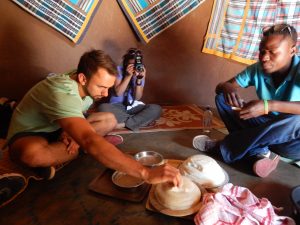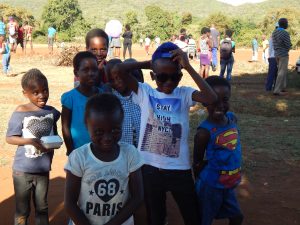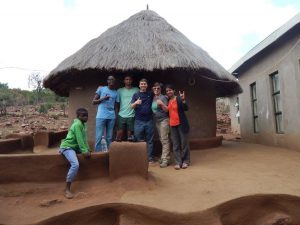
Life and Death in HaMakuya
By Katie Peige
After about ten days experiencing the magnificent wildlife that Kruger had to offer, we left the park bound for our homestays. After leaving the guarded fences of the park, our surroundings changed dramatically as the animal sightings tapered off (we were still seeing some birds) and humans were reintroduced into the environment. The exotic animals were gone and replaced with goats and chickens running around yards fenced in with branches and barbed wire. Colorful mud huts slowly changed the landscape and with them, scattered trash sprinkled the roadsides like petals welcoming the new visitors.
We drove to David’s Tshulu Trust camp, where primitive yet lovely treehouse-like permanent tents had a beautiful view of the river. Apparently we were in a very remote place as there wasn’t a chance of getting a cell phone signal if you needed one except if you climbed to the top of some hill and stood on your left leg. Oh and by the way, there could be lions since there had been fresh lion tracks in the area.
 After going over the surveys that we would be conducting with the people about their accessibility to water we learned some key phrases to prepare ourselves for the home stay experience. I couldn’t get any of it to stick in my brain and was not able to say much besides good morning. We were all dropped off in sets of four at three different huts in three small villages that were a part of the larger village of HaMakuya. Each group had one young translator assigned to us.
After going over the surveys that we would be conducting with the people about their accessibility to water we learned some key phrases to prepare ourselves for the home stay experience. I couldn’t get any of it to stick in my brain and was not able to say much besides good morning. We were all dropped off in sets of four at three different huts in three small villages that were a part of the larger village of HaMakuya. Each group had one young translator assigned to us.
The village did not have any indoor plumbing and so to use the bathroom there were pit latrines several yards away from the houses. For some reason, we were told not to use the bathroom in our yard but to go next door to use theirs. To do that, we had to climb through a barbed- wire fence which was basically barbed wire held up by large branches. Once through the fence, you had to move a large boulder that was holding a large piece of scrap metal that was hinged to the walls for the door. The door didn’t close all the way so I always brought Somi along with me to hold the door closed (and to be honest I was a little afraid of the whole situation). It was definitely a new experience living in a place with no running water and I soon learned more what that was like from completing the water surveys. All of the houses except one with their own bore hole had to wash their clothes in the river. Otherwise for cooking and bathing (standing in a basin and ladling water over your body (we didn’t witness this)) the water was either hauled by large jugs in a wheel barrel or on your head. This water was not safe for us to consume and so we were provided with bottled tap water for our thirst and for cooking. By UN standards, the water situation here was very poor in terms of availability, reliability and safety.
 As we were warned, we were swarmed by children. I started singing nursey rhymes and clapping songs that I still remembered with the kids. I never had a real opportunity to speak to the adults. The man of the house was not usually there and when he was, it seemed that he was not sober. The woman of the house was constantly working, either cooking or cleaning, and she didn’t seem like she was particularly interested in making conversation. So because of that I never had a great understanding of who was in their family (every day random children would appear) or what was going on exactly.
As we were warned, we were swarmed by children. I started singing nursey rhymes and clapping songs that I still remembered with the kids. I never had a real opportunity to speak to the adults. The man of the house was not usually there and when he was, it seemed that he was not sober. The woman of the house was constantly working, either cooking or cleaning, and she didn’t seem like she was particularly interested in making conversation. So because of that I never had a great understanding of who was in their family (every day random children would appear) or what was going on exactly.
The last full day there was rather traumatic. A young girl (around 11) named Bridget, who I had bonded with over the clapping games and different songs, was all smiles and happy until something happened when she was playing with the other children. All of a sudden she was crying and when I went to comfort her she hit me to leave her alone. It wasn’t until later that I found out that her mother had just died a few days ago from complications of child birth. For something that could have been treated, now three young girls do not have a mother and have no way of remembering her as photographs are not available.
This story hit me like a ton of bricks and made think of my dear grandmother who passed away in December. I was so distraught for weeks for my grandmother who was 93 years old, I couldn’t even imagine losing my mother at such a young age who I am sure was probably younger than 30 years old. The next day, I wanted to be like a big sister for Bridget and offered to help her paint her nails. I wanted to do a good job but the nail polish was already partially dried and so it had a gummy consistency and wouldn’t lay smoothly. I was so distraught that I couldn’t do a better job for Bridget but she seemed quite happy with it and started playing right away, further messing the manicure up so that now bright orange specks were all over her clothes. Bridget had looked at me kinda funny when I advised her to blow on her nails and let them dry.
 Despite the weird bathroom situation, sleeping on the hardest floor imaginable, and eating worms, I believe this moment with Bridget will stay with me the longest. It puts a real human face on short life spans in South Africa and much of the developing world. In HaMakuya the average life span is something like 50 years old, a heartbreaking number that is about 30 years shorter than our average lifespan.
Despite the weird bathroom situation, sleeping on the hardest floor imaginable, and eating worms, I believe this moment with Bridget will stay with me the longest. It puts a real human face on short life spans in South Africa and much of the developing world. In HaMakuya the average life span is something like 50 years old, a heartbreaking number that is about 30 years shorter than our average lifespan.

